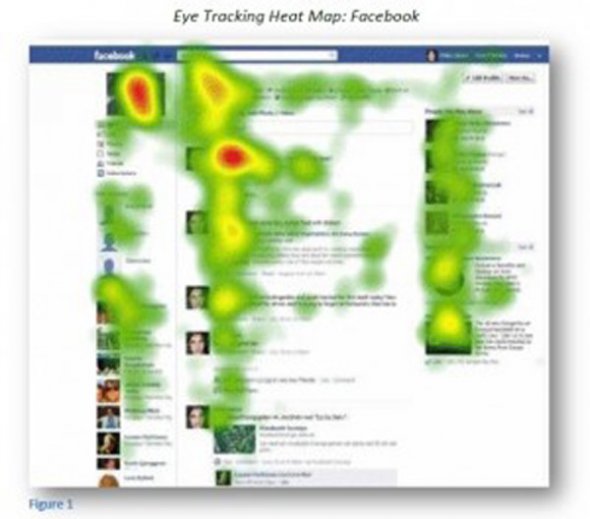I came across a new technology a few weeks ago that I found to be profoundly interesting. This is a little off topic from what we normally discuss on WorkPuzzle, but I think you’ll find it thought-provoking as well. It concerns eye-tracking software.
While this technology has been around for awhile, it is becoming more useful to marketers because of companies like EyeTrackShop.
This company has learned to harness the little webcams that are now nearly ubiquitous on laptops. When marketers want to test an ad, they send it to EyeTrackShop and the company distributes it to thousands of volunteers/affiliates around the world. In turn, the testers look at the ad while the software automatically tracks where their eyes naturally focus.
For example, the ad below was recently submitted for testing. The heat-map demonstrates where the consumers’ eyes focus as a person views both versions of the ad.
Ad example courtesy of FutureNow/ Bryan Eisenberg
As the red (hot) areas indicate, the ad on the left is much better at getting the consumers' eyes to focus on the product and the message. Even small changes, such as where the model focuses her gaze, can make a significant difference in the effectiveness of an ad. EyeTrackShop can complete research like this in just 48 hours, giving designers quick feedback on how to tweak their ads to make them most effective.
Here’s another example: One of the questions we often get in our business of recruitment advertising is…Why don’t you use banner ads to attract people to your recruitment opportunities?
We know these types of ads are not very effective because we’ve tested them. But, now we know why they are ineffective. Look how an average consumer views these three web pages:
Ad example courtesy of Jakob Nielsen/useit.com
The three examples demonstrate what happens during quick scanning, partial reading, and thorough reading. Those green boxes are banner ads of various types. The consumers' eyes have been trained to totally ignore these.
So, what does this have to do with Facebook and real estate? I’ve noticed over the last few years, that there are many real estate companies that are being encouraged to embrace Facebook (and perhaps other social networks) as a way to market to potential real estate clients.
My question…what can eye tracking technology tell you about the effectiveness of such a strategy?
Here is how the human eye processes a typical Facebook page:
Image courtesy of EyeTrackshop/Mashable
You’ll notice right away that pictures draw most of the eye’s attention in Facebook. Once a picture grabs a person’s attention, the verbiage around the picture is then more lightly consumed.
Many business strategists believe this is the reason that Facebook bought Instragram a few months ago. Pictures are clearly the definitive “killer app” on Facebook, and having a “picture only” social network gain traction so quickly was a threat.
What does this have to do with real estate marketing for agents? I would argue that the large majority of successful sales/marketing strategies on Facebook are going to involve the creative use of pictures. Pictures will be the only reliable mechanism for attracting a person’s eyes and garnering their attention. And I'm not talking about just any pictures—the images would have to be compelling and engaging to compete with relationship-based images (i.e. I’m interested in a picture because it is a friend, relative, or acquaintance.).
This kind of marketing strategy and execution is difficult to both conceptualize and maintain. While a few agents will be able to make it happen, most agents will struggle to be effective.
So, next time some consultant tries to sell your agents a Facebook marketing package, you’ll be better equipped to qualify the promised benefit. Ask your vendor if they have done any eye tracking analysis on what they’re selling.
 Editor's Note: This article was written by Ben Hess. Ben is the Founding Partner and Managing Director of Tidemark, Inc. and a regular contributor to WorkPuzzle. Comments or questions are welcome. If you're an email subscriber, reply to this WorkPuzzle email. If you read the blog directly from the web, you can click the "comments" link below.
Editor's Note: This article was written by Ben Hess. Ben is the Founding Partner and Managing Director of Tidemark, Inc. and a regular contributor to WorkPuzzle. Comments or questions are welcome. If you're an email subscriber, reply to this WorkPuzzle email. If you read the blog directly from the web, you can click the "comments" link below.




